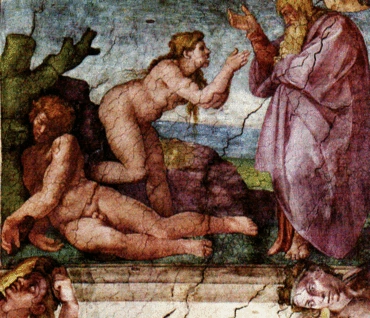创世纪2:22的解释
原作者: Brian David (机器翻译成: 中文)

主就是生命本身。我们是生命的接受者。我们赋予生命独特的形式,因为我们作为容器有独特的形状,通过自由意志,我们可以选择如何完全接受生命。但我们并没有自己的生命。由此可见,我们越是转向主,接受生命,我们就越有活力;而我们越是转向,我们就越是死亡。由此也可以看出,相信生命是我们自己的--以及由此带来的所有爱、思想和力量--实际上是生命的对立面。
这就是最深的地狱里的人的状态,他们拒绝主的一切,甚至拒绝他的存在,并声称所有的生命是他们自己的。事实上,他们之所以活着,只是因为主强迫他们以必要的数量维持生命。
在某种意义上,这就是肋骨所代表的--它是人,是有生命的,但只是在最有限的方面。当最古老的教会的人(亚当)想要领导自己,并将生命作为自己的感觉时,主不得不使用他们身上最死的那一面来实现他们的愿望。他不得不使用那块骨头,它代表了我们最地狱般的潜力,如果我们完全拒绝主,我们将成为什么。
但后来,主做了一件神奇的事。他把那块骨头变成了活肉,变成了一个新的人:女人夏娃。这代表着主把我们身上最死的、最地狱般的一面建立起来,使其感受到生命是自己的,但可以承认生命实际上来自主,因此可以再次成为生命的接受者。这并不像以前那样纯粹;人们不再能直接与主交流。但他们有了自己想要的东西:一种自我意识。
文献中称这--肋骨和女人--为拉丁语的 "proprium",本质上意味着 "自我"。肋骨代表自己的本体,它是地狱般的存在。女人代表被主赋予生命的本体。
Arcana Coelestia#3643
3643. I have noticed that those in heaven dwell beneath a clear, bright sky like that of morning and midday, extending also towards evening, and likewise in a warmth like that of spring, summer, and autumn. But those in hell dwell under a dim, cloudy, and darkened sky, and also in the cold [of winter]. I have noticed that between the two in general a balance is kept; also that insofar as love, charity, and consequently faith are present in angels, they dwell under a clear sky and in the warmth of spring, and that insofar as hatred and consequently falsity are present in those in hell they dwell in thick darkness and in coldness. And as stated above, the light in the next life holds intelligence within it, the warmth love within it, while thick darkness holds insanity within it, and cold hatred within it.






